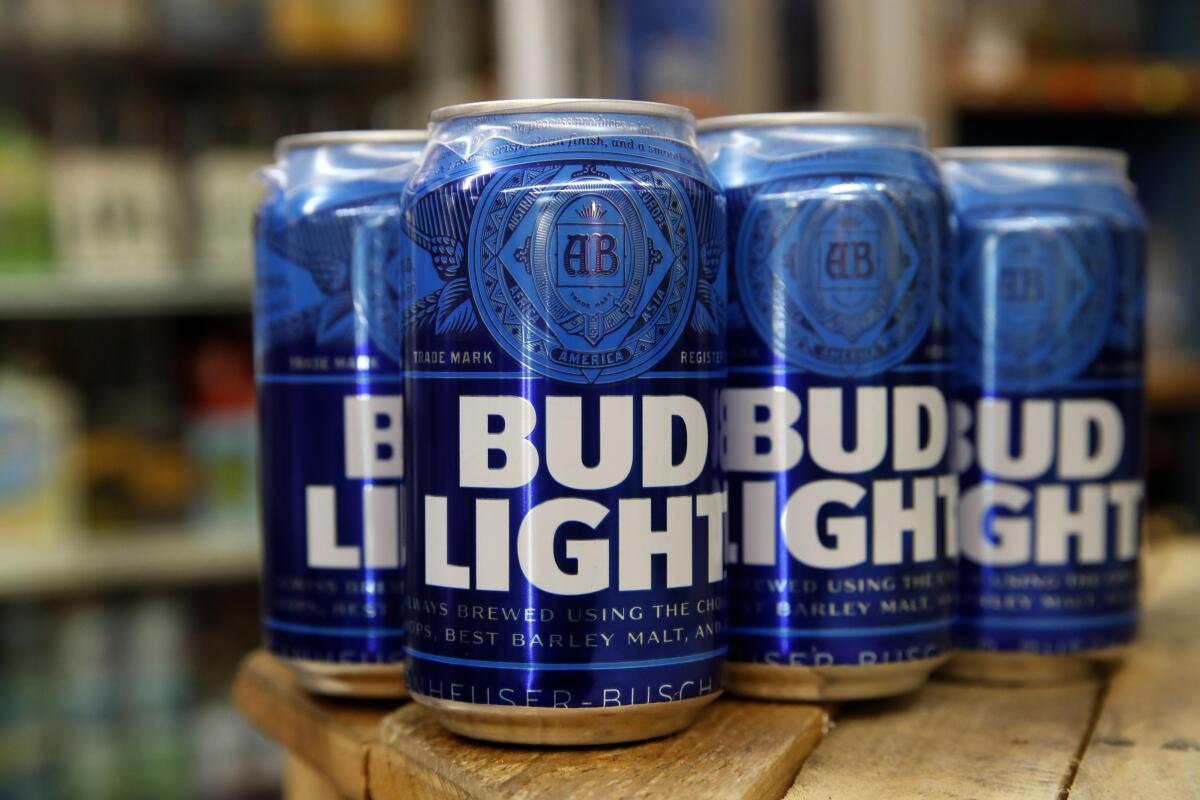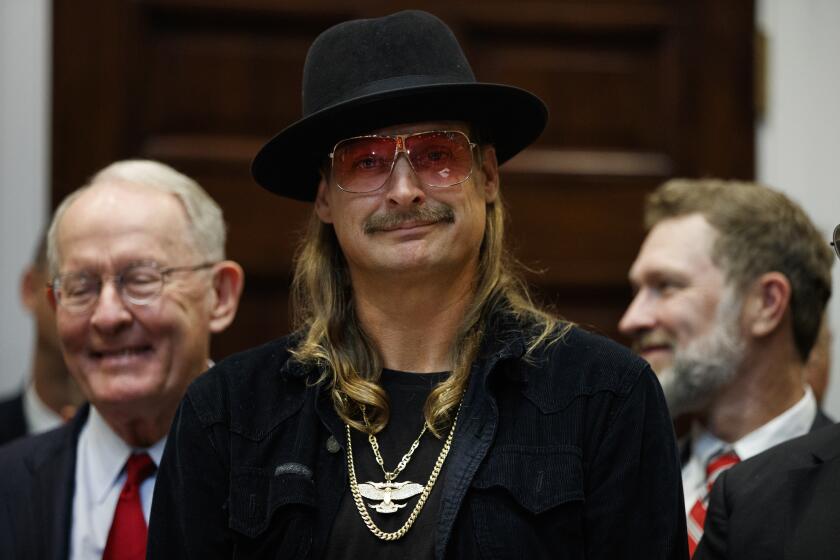Anti-trans backlash against Bud Light has executives on the hot seat. What’s going on?

- Share via
On Friday, Anheuser-Busch InBev, the parent company of Bud Light, placed two of its marketing executives on leave after public outcry from conservative corners over the beer brand’s partnership with a transgender influencer.
The move follows weeks of controversy, including a video of Kid Rock shooting cases of Bud Light and calls for a boycott backed by conservative figures including Florida Gov. Ron DeSantis. Here’s everything you need to know.
Who is Dylan Mulvaney?
Dylan Mulvaney is a transgender influencer and actor who has been using her social platforms over the last year to share her gender-transition journey in a TikTok series called “Days of Girlhood.” Mulvaney, 26, grew up in San Diego and studied musical theater in college. She landed a role in the Broadway musical “The Book of Mormon” before the pandemic halted the tour.
When did this all start?
On April 1, Mulvaney posted a video on her Instagram account, which has about 1.8 million followers, to promote a Bud Light contest during the NCAA basketball tournament. In the video, she sets five Bud Light cans down on a table and opens one as she talks about the tournament, adding that she’s also celebrating an important milestone in her journey — day 365 of womanhood. “Bud Light sent me possibly the best gift ever: A can with my face on it,” she says as an image of the personalized can appears in the video.
Kid Rock posted a video of himself shooting up Bud Light cases after the beer brand partnered with actor and transgender activist Dylan Mulvaney.
What happened after that?
The collaboration set off a backlash among conservatives against Mulvaney, the brand and some of its executives. The hashtag #BoycottBudLight took off online, and consumers shared videos of themselves pouring out Bud Light bottles or throwing away six-packs. Kid Rock posted a video of himself shooting up a stack of Bud Light cases. Country music star Travis Tritt said on Twitter that he would no longer use Anheuser-Busch products in his tour hospitality rider. Some Republican officials including DeSantis said they no longer supported the brand and backed consumers in doing the same.
On April 4, the company defended its partnership with Mulvaney, writing that it “works with hundreds of influencers across our brands as one of many ways to authentically connect with audiences across various demographics.”
“From time to time we produce unique commemorative cans for fans and for brand influencers, like Dylan Mulvaney,” Anheuser-Busch said in the statement. “This commemorative can was a gift to celebrate a personal milestone and is not for sale to the general public.”
About 10 days later, as the turmoil continued, Chief Executive Brendan Whitworth issued a public statement. “We never intended to be part of a discussion that divides people,” Whitworth said. “We are in the business of bringing people together over a beer.”
Even as the brand has come under right-wing attacks, others have criticized the company’s response to the storm.
What has the controversy meant for Bud Light?
It has resulted in a reorganization of the brand’s marketing operations, with two executives involved being sidelined from their jobs, at least temporarily. The Wall Street Journal reported Sunday that Alissa Heinerscheid, Bud Light’s vice president of marketing who oversaw the partnership, and her boss Daniel Blake, who oversees marketing for Anheuser-Busch’s mainstream brands, were placed on leave. An Anheuser-Busch spokesperson confirmed those moves to The Times, declining to provide additional details “in the interest of our employees’ privacy and safety.” Heinerscheid is the first woman to lead marketing for Bud Light in the brand’s 41-year history.
The spokesperson said Bud Light had also made “some adjustments to streamline the structure of our marketing function to reduce layers so that our most senior marketers are more closely connected to every aspect of our brands activities.”
According to Bump Williams Consulting figures cited by Beer Marketer’s Insights, sales volume for Bud Light tumbled 21% in the week that ended April 15.
Drew Barrymore and trans TikTok star Dylan Mulvaney sat on the floor on her show Monday, discussing online hate. That act sparked more online hate.
What do social issues have to do with Bud Light, anyway?
For years, Anheuser-Busch has been trying to evolve, with executives saying that Bud Light needed to appeal to younger consumers in order to stay on the shelves.
Heinerscheid described Bud Light as a brand in need of a revival in a March interview on the “Make Yourself at Home” podcast.
“I had a really clear job to do when I took over Bud Light,” said Heinerscheid, who stepped into the role in 2022. “It was, this brand is in decline, it’s been in decline for a really long time, and if we do not attract young drinkers to come and drink this brand, there will be no future for Bud Light.”
That meant the brand, which had a reputation for being “fratty,” needed to become “truly inclusive” and appeal to both men and women, she said.
The partnership with Mulvaney is not the first time Bud Light has waded into social issues in its marketing campaigns. It previously partnered with LGBTQ+ organizations such as GLAAD in 2019 to celebrate Pride Month in the U.S. and the National LGBT Chamber of Commerce in 2022 to support LGBTQ+-owned businesses amid post-pandemic reopenings.
But the backlash against its collaboration with Mulvaney has been swift, and the response comes as red states across the country are restricting transgender healthcare and rights. The Associated Press reported that more than 450 bills have been introduced in statehouses around the country this year targeting transgender people, which LGBTQ+ advocates say is a record number.
More to Read
Inside the business of entertainment
The Wide Shot brings you news, analysis and insights on everything from streaming wars to production — and what it all means for the future.
You may occasionally receive promotional content from the Los Angeles Times.













